
Ts’akë ze’ Howihkat, Freda Huson, passes an installation of red dresses as she waits for police to enforce Coastal GasLink’s injunction at the Unist’ot’en healing center on Feb. 9, 2020. The red dresses symbolize thousands of missing and murdered Indigenous women and girls. Photo: Amber Bracken
“On February 6, Unist’ot’en members watched on social media as the RCMP mounted a dramatic raid before dawn. . . arresting six people.
“But rather than serving to quell the resistance, the arrests inspired a wave of solidarity protests and transportation blockades across Canada.”
Elsewhere, the Pope and Greenpeace are pleading for protection of the Amazon rain forest.
No Surrender – After Police Defend a Gas Pipeline Over Indigenous Land Rights, Protesters Shut Down Railways Across Canada
By Alleen Brown, Amber Bracken, The Intercept, February 23 2020
https://theintercept.com/2020/02/23/wetsuweten-protest-coastal-gaslink-pipeline/
The weeks leading up to Dr. Karla Tait’s arrest were tense at the Unist’ot’en camp, which for a decade has stood in the way of fossil fuel pipeline construction through the Wet’suwet’en Nation’s unceded territory in British Columbia.
On New Year’s Eve, British Columbia’s Supreme Court granted an injunction barring members of the Indigenous nation from obstructing work on TC Energy’s Coastal GasLink pipeline.
The Royal Canadian Mounted Police were authorized to enforce the order, but no one knew when they would come.
Tait’s aunt Freda Huson has lived on the territory since she built the first Unist’ot’en cabin in 2010, directly in the path of at least three proposed pipelines that would stretch across pristine mountain wilderness to export facilities in the coastal community of Kitimat.
Unist’ot’en, which has grown to include a bunkhouse, a traditional pit house, traplines, and a three-story healing center, is associated with one of 13 houses that make up the Wet’suwet’en Nation.
The camp is the oldest and most remote of a series of Wet’suwet’en camps established along an old logging road as an assertion of the nation’s right to decide what happens on their territory.
Until this month, members controlled access to the area with gates constructed in the middle of the road.
One of the proposed pipelines, Enbridge’s Northern Gateway tar sands oil pipeline, was canceled in 2016.
The future of a second, the Pacific Trails natural gas pipeline, was thrown into uncertainty after Chevron announced plans to divest its 50 percent share.
But TC Energy, formerly known as TransCanada, has forged ahead with the Coastal GasLink project — despite opposition from the Wet’suwet’en Nation’s traditional leaders, the hereditary chiefs.
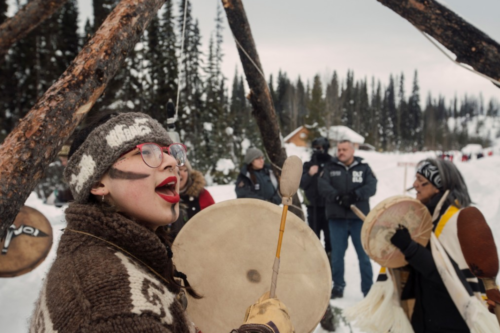
Victoria Redsun, a Denesuline supporter, stands in ceremony with Freda Huson and others as police arrive at the healing center on February. 10, 2020.
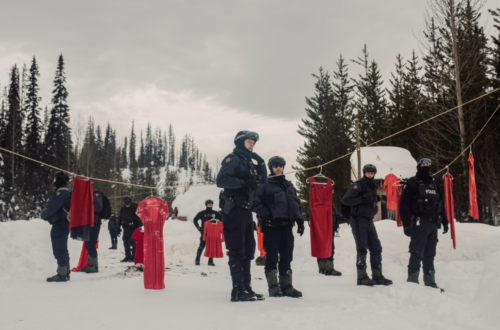
Royal Canadian Mounted Police stage among red dresses as they prepare to enforce Coastal GasLink’s injunction.
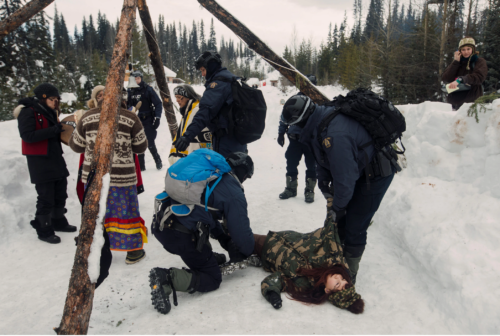
Nlaka’pamux supporter Autumn Walken goes limp as she is arrested at the Unist’ot’en healing center on Feb. 10, 2020. Huson and five others were arrested that day.
All 3 photos: Amber Bracken
The hereditary chiefs, along with Unist’ot’en camp supporters, object to the pipeline on the grounds that it could contaminate land that is a part of who they are and that they rely on to harvest food and medicines and draw water.
The land plays an integral role in programming at the Unist’ot’en healing center, where Tait works, which seeks to help Indigenous patients confront colonial trauma.
TC Energy obtained an initial injunction to force Unist’ot’en members to get out of the way of construction in December 2018.
Royal Canadian Mounted Police commanders claimed “lethal overwatch” was required, according to documents revealed by The Guardian, and instructed officers to “use as much violence toward the gate as you want.”
After the RCMP arrested more than a dozen pipeline opponents that January, a strained peace was established.
Police maintained a presence in the area, spending more than $3 million to establish a station halfway up the logging road to the camps.
Unist’ot’en members negotiated access for pipeline workers as long as they followed an agreed-upon protocol, but TC Energy claimed the checkpoints continued to slow their work.
In the latest court order, the judge argued that the Wet’suwet’en Nation’s title claims and jurisdiction remained unresolved.
In response, pipeline opponents abandoned the access agreement, and the hereditary chiefs demanded that Coastal GasLink vacate the territory immediately.
On February 6, Unist’ot’en members watched on social media as the RCMP mounted a dramatic raid before dawn on a smaller support camp down the road, arresting six people.
But rather than serving to quell the resistance, the arrests inspired a wave of solidarity protests and transportation blockades across Canada.
Protesters shut down ports, roads, and railways from Vancouver to Saskatchewan, and a blockade set up by Indigenous-led protesters from the Tyendinaga Mohawk Territory in Ontario halted commuter rail traffic between Montreal and Toronto.
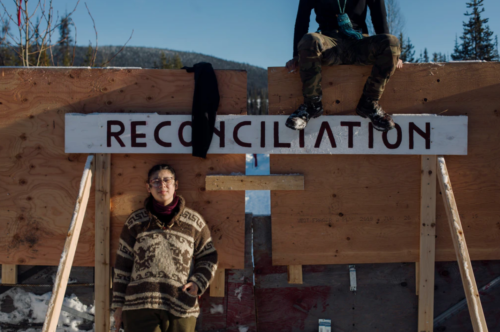
Victoria Redsun, left, waits with another supporter at the gate leading to the Unist’ot’en camp. The word “reconciliation” is written across the gate as a statement of what police, the government, and Coastal GasLink would destroy by forcing entry into Wet’suwet’en traditional territory.
Photo: Amber Bracken
At least 40 officers descended on a second Wet’suwet’en camp on February 7, arresting four Indigenous people who refused to leave.
It took another three days for police to move on Unist’ot’en.
On February 10, a helicopter delivered RCMP officers and snowmobiles behind the Unist’ot’en gate. They watched from a hill overlooking the camp as more officers approached from the road.
Surrounded on all sides, Tait, her mother, her aunt, and four supporters stood near the barrier, praying and drumming.
Tait was the third to be arrested. “Two officers came around me and held my arms to try to prevent me from drumming,” she said. They continued to sing, even as they were loaded into the police van.
While the Canadian government continues to pursue a years-long effort to heal its relationship with Indigenous people, for many, the arrests of the Unist’ot’en matriarchs were representative of the government’s unwillingness to take meaningful action toward reconciliation — especially when it comes to land rights.
Indeed, documents uncovered by journalists and researchers confirm that officials have strategized furiously about how to prevent the Wet’suwet’en people’s assertion of land rights from getting in the way of the message that Canada is open for business.
“The violence of Canada and the emptiness of its commitments to us as Indigenous people were laid bare in their actions, and their forcible removal of us in the midst of ceremony,” Tait said.
“The events we experienced leading up to February 10 are another culmination of the efforts of Canada to discredit and criminalize us for simply existing on our land as we always have — for defending our rights to our landbase and our historic economy, our ways of empowering ourselves — because of the threat to the capitalist economy.”
In the wake of the police raids, leaders of the movement declared, “Reconciliation is dead.”
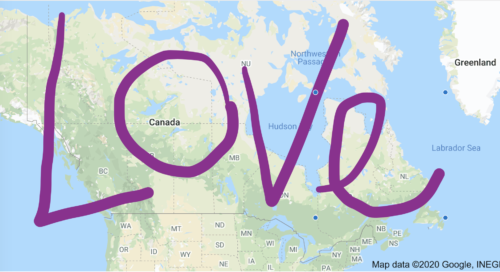
I invoke Sanat Kumara, Universal Law,
the Divine Blessings, Virtues, and
Dimensional Growth Patterns
for BALANCE in Canada
& elsewhere on Gaia.

THE SCALES OF JUSTICE, OF WORTH AND OF THE UNIVERSE, IN BALANCE
Bolsonaro Attacks Pope Francis
Over Pontiff’s Plea to Protect the Amazon

Jair Bolsonaro also said: ‘All Australia caught fire and nobody’s talking about Australia. Where is the zealotry for Australia?’ Photograph: Adriano Machado/Reuters
By Staff and agencies in Brasília, The Guardian, February 13, 2020
https://www.theguardian.com/world/2020/feb/13/brazil-jair-bolsonaro-pope-francis-amazon
Brazil’s far-right president Jair Bolsonarohas lashed out at Pope Francis after the pontiff pleaded for the protection of the Amazon rain forest, and attacked the environmental group Greenpeace as “rubbish”.
“Pope Francis said yesterday the Amazon is his, the world’s, everyone’s,” said Bolsonaro, who has often railed against international criticism of his environmental policies as an attack on Brazilian sovereignty.
“Well, the pope may be Argentinian, but God is Brazilian.”
The comment on Thursday came a day after Francis published a text urging Catholics to “feel outrage” over the exploitation of indigenous people and devastation caused by mining and deforestation in the Amazon.
The comments also coincided with a visit to the Vatican by the former Brazilian president Luiz Inácio Lula da Silva – a fierce opponent of Bolsonaro. Lula met and received a blessing from Pope Francis and said on Twitter that the two discussed “prospects for a more just and fraternal world”.

Since taking office in January 2019, Bolsonaro has faced condemnation from environmentalists and the international community over his policies on the world’s largest rainforest, which was devastated by record fires last year.
Last week, he again drew criticism for proposing a bill that would allow mining, farming and hydroelectric power projects on formerly protected Amazon land, calling it a “dream”.
Deforestation of the Brazilian Amazon increased 85.3% in Bolsonaro’s first year in office, to more than 9,000 sq km (3,500 sq miles).
Speaking to journalists outside the presidential residence in Brasília, Bolsonaro questioned why there had not been, in his view, a similar world reaction to the recent bushfires in Australia, which burned more than 100,000 sq km (around 39,000 sq miles).
“All Australia caught fire and nobody’s talking about Australia. Where is the zealotry for Australia?” he said.
Bolsonaro also launched a new attack on Greenpeace.
“What is this crap called Greenpeace? Nothing but rubbish,” he said when asked about his moves to promote what he calls “sustainable development” by opening protected areas of the Amazon to mining and farming.
Greenpeace has been an outspoken critic of Bolsonaro’s policies, accusing him of a “racist, anti-environmental agenda” that harms Brazil’s environment and its indigenous peoples.
The Brazilian leader often answers his critics with vitriolic attacks.
In October, he tried, without evidence, to link Greenpeace to a massive oil spill off Brazil’s north-east coast, calling it a “terrorist act”.
Patagonia’s New Film
Celebrates Activists Fighting
Urban Oil Drilling in L.A.
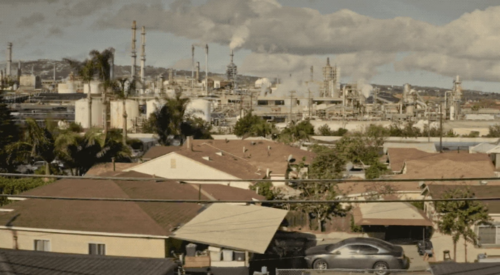
By Jeff Beer, Fast Company, February 27, 2020
A single community is home to more than half the oil wells in Los Angeles, and its residents are feeling the effects as the apparel brand’s new film, ‘District 15,’ details.
Wedged between the port of Los Angeles, the city of Long Beach, and the luxurious homes of Rancho Palos Verdes is the neighborhood of Wilmington. Listed at less than 10 square miles, with a population of about 60,000, it’s also home to the third biggest oil field in the continental United States.
Its primarily Latino residents count 479 active oil wells as neighbors—and there is a group of young activists fighting to improve the quality of air and water, and establish more of a barrier between their daily lives and the looming industrial presence.
District 15 is a new short film produced by Patagonia that outlines the fight undertaken by the Communities for a Better Environment group as it lobbies city council and Mayor Eric Garcetti to establish a 2,500-foot distance between oil drilling operations and Wilmington’s schools, hospitals, and churches.
Directed by Anjali Nayar, it’s a departure from the wide open spaces we’ve become accustomed to seeing in Patagonia’s growing catalog of activist branded content. The middle of Los Angeles feels distinctly different than protecting a surf break and Chilean fishing village in 2015’s The Fisherman’s Son or last year’s take on offshore, penned fish farms in Artifishal. And it is hundreds of miles from Missoula, Montana, where earlier this month the brand premiered its new feature-length documentary Public Trust, about America’s system of public lands and the fight to protect them.
Please join 8 @ 8 daily
holding and sending Love

